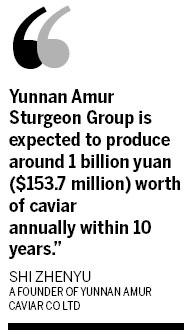Company aims to revolutionise the production of caviar in the country
KUNMING - As the taste for luxury goods grows in China, the nation's sturgeon farmers could be entering business on a different scale.
That's after a new company announced its ambition to build the world's No 1 caviar brand in Kunming, in the southwestern province of Yunnan.
"Yunnan Amur Sturgeon Group is expected to produce caviar worth around 1 billion yuan ($153.7 million) annually within 10 years," said Shi Zhenyu, a founder of Yunnan Amur Caviar Co Ltd, one of China's biggest suppliers of sturgeon.
China's leading fishery company Dalian Zhangzidao Fishery Group has seen the potential in the business and has invested 100 million yuan, holding 20 percent of the company's stock.

Caviar, which consists of processed, salted, non-fertilized sturgeon's roe, is currently fetching prices of around 8,000 yuan for a kilogram of the regular variety. The high-end product can sell for as much as 5,000 euros ($7,112) a kilogram.
The potential reward from growing sturgeon, one of the world's most valuable fish, is high, said Liu Jiankui, head of a farm in Huangning County, about 200 kilometers from Kunming.
"A 30-kilogram-fish contains about 6 kilograms of eggs. If each kilogram sells at the lowest price of 8,000 yuan, one fish fetches about 50,000 yuan," said Liu.
Liu's farm covers an area of 3.33 hectares and boasts 168 tanks, cultivating various types of sturgeon, such as Beluga, Russian, and Siberian. Liu said the farm is expected to produce more than five tons of caviar this year.
Amur has 10 facilities in Yunnan and Hebei provinces and in the municipalities of Chongqing and Beijing. Its farms currently hold around 210,000 sturgeon, ranging from only a few months old to more than 10 years, according to Liu. The company has been engaged in farming sturgeon since 1999. By controlling the water temperature and feed, it's possible to encourage the fish to grow at a much faster rate in farms.
"Sturgeon take more than 10 years to mature in their natural environment in the Heilongjiang River in the north of China, but the period of growth can be cut by half here in Yunnan," Liu explained.
Marketing was a growth bottleneck for the company, and the cooperation with Zhangzidao Fishery is regarded as an association between two strong enterprises.
Zhangzidao Fishery is China's most famous sea food supplier, providing abalone, trepang, sea urchin, and scallop among others. Zhangzidao Fishery's success in brand operation and promotion will help to expand Amur's business, said Wu Hougang, president of Zhangzidao Fishery.
Production of caviar in the wild has declined sharply in recent years, as environmental damage destroyed the sturgeon's natural habitat. In 2006, the United Nations Convention on International Trade in Endangered Species extended a temporary trade ban on all wild sturgeon, with the exception of Persian roe from Iran. Caviar from farmed sturgeon has increasingly filled that gap.
China has become one of the world's biggest producers of farmed sturgeon. That's mostly for the flesh and not the roe, however, as only a small number of companies are able to produce caviar, said Lei Jilin, academician of the Chinese Academy of Engineering Science. Lei said a number of factors are hindering the development of sturgeon farming in China. Few places are rich in the cold water resources required for growing sturgeon. Moreover, the long growth period demands greater investment and more risk, and there is a lack of cooperation between companies in the industry.
"We are glad to see that the establishment of Amur Group is a good example of a win-win partnership. But it will require more work to meet global standards and produce high-quality caviar to reach its goal of becoming the world No 1," said Lei.




